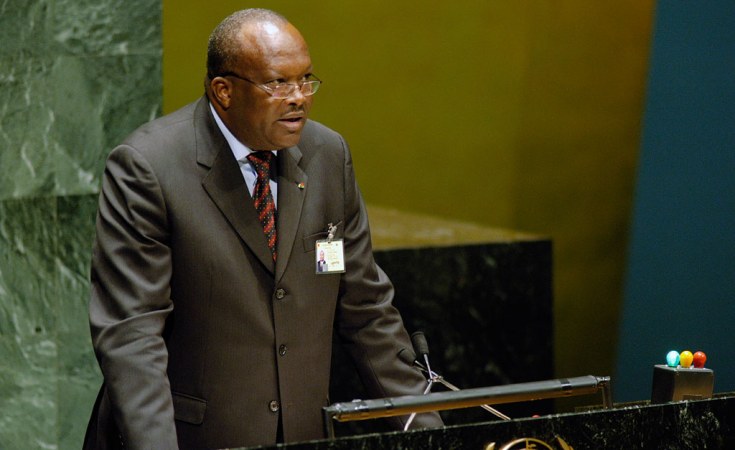When Burkina Faso's President Blaise Compaore introduced a bill in Parliament in October 2014 to modify the Constitution to extend his term in office, he never imagined that it would trigger an uprising that would end his 27-year-long authoritarian rule.
The transitional period that ensued was set to culminate with presidential and legislative elections on October 11. But barely a month before the elections, on September 16, the presidential guard loyal to Compaore staged a coup d'etat. Within days, the Economic Community of West African States (Ecowas) stepped in to mediate a situation that threatened to degenerate into violence.
The resulting agreement this week resembles the elite "pacts" that ushered in transitions to democracy in Southern Europe and Latin America. Scholars suggest that such agreements have been less common in Africa, but the Ecowas deal has the hallmarks of a classic pact: amnesty for the junta, withdrawal of the military from the transitional government, restoration of the transitional government and its leader, interim President Michel Kafando, amnesty for human rights violations committed during the coup period, release of all detained persons and opening up the political process to pro-Compaore candidates.
Any further setbacks for democracy in Burkina Faso will present the risk of broader regional turbulence, given Ouagadougou's pivotal - albeit small - role in helping to stabilize the Sahel region, which is home to several violent Islamist movements. Consequently, the international community should not succumb to the attraction of General Gilbert Diendere, the leader of the coup, who while charming in personal dealings does not enjoy broad appeal either within the army or among the people.
Diendere's military junta initially claimed to count the army chief of staff, Brigadier General Pingrenoma Zagré, as supportive of the coup, but he quickly distanced himself from it, condemned violence against the population and started pressuring the junta to disarm and step down.
A high risk of confrontation remains. Outside the regime, civil society groups and human rights activists in Burkina are at loggerheads with Diendere over alleged crimes and human rights violations.
The situation at the moment thus resembles the pacting model of transitions sketched out by the scholars Guillermo O'Donnell and Philippe Schmitter in their book, Transitions from Authoritarian Rule: "soft-liners" in the regime have aligned with civil society elements in favor of a transition, while "hard-liners" see the status quo as the only guarantee of their own freedom.
The Ecowas-mediated deal is meant to appease the latter, but this will come at a high cost for popular groups expecting accountability for human rights violations. Elections are therefore critical for the path forward: free and fair polls with results accepted by all sides will be essential for the completion of the transition and a broad political peace will depend on the legitimacy of the process.
Ecowas proposes to postpone the elections until November 22. Whenever they take place, the perceived quality of Burkina Faso's elections will hinge upon who can take part.
The Ecowas deal also addressed a recent electoral law that prevented prominent pro-Compaore candidates from running for office. A ruling by the Ecowas Human Rights Court in July criticized the law, urging the Burkina government to ensure that citizens who want to run for seats in parliament or for president can freely do so. Diendere presented this exclusion as one reason for his coup. But his main motive was personal and self-serving. He desperately hopes to escape prosecution for crimes committed during the Compaore regime, when he led the feared security apparatus.
The presidential security guard, which led the recent coup, also fears for its future. The coup happened just one day after a Reconciliation and Political Reform Committee presented its findings to Prime Minister Yacouba Isaac Zida, recommending the guard's dissolution on the ground that Burkina should have only one army.
The international community urgently needs to vocalize its support for restoration of the transitional government and for elections that do not exclude politicians based on their views. To honor the recently-brokered deal, the restored transition government should take the July Ecowas criticism seriously and amend the electoral law. Otherwise the divisions within the army and mounting popular resistance from civil society could lead to further confrontation and possible chaos.
This is the world's chance to prevent the humanitarian crisis that would follow a further deterioration in the Sahel's security, and to deepen its democratic commitment to the continent.
Jean-Baptiste Guiatin is a graduate student in Comparative and Regional Studies at American University. A. Carl LeVan is an assistant professor at American University who tweets @Dev4Security. He is the co-editor of a new book, African State Governance: Subnational Politics and National Power (Palgrave 2015).


